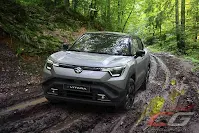Remember the eVX Concept that Suzuki Auto Philippines brought in for the Philippine International Motor Show? Well, this is the production model that comes from that: the Suzuki e Vitara.
Designed around the concept of “Emotional Versatile Cruiser,” the e Vitara is Suzuki’s first global BEV. It rides on a dedicated battery electric platform, the Heartech-e and comes with an electric all-wheel drive system called Allgrip-e.
Like the combustion engine Heartech platform, Suzuki designed the Heartech-e to be as lightweight yet space-efficient as possible. For example, they’ve managed to eliminate underfloor members to maximize battery capacity, while still incorporating safety to protect the high-voltage powertrain. Moreover, it maximizes the wheelbase while shortening the overhangs as much as possible.
From there, Suzuki uses a highly efficient eAxle powertrain that combines the motor and inverter. It comes in three states of tune—144 horsepower (106 kW), 189 Nm; 174 horsepower (128 kW), 189 Nm; and 184 horsepower (135 kW), 300 Nm. The first two is representative of the 2WD version, while the latter is the AWD.
Oh, and regarding its all-wheel drive system, the e Vitara’s Allgrip-e does mean having dual electric motors that provide not just responsiveness, but control over any terrain. A special “Trail” mode also acts as a limited slip differential.
And as for the battery, the e Vitara either uses a 49-kWh or 61-kWh lithium-iron phosphate battery.
The Suzuki e Vitara will roll out from Suzuki Motor’s plant in Gujarat in India starting next year. It will be exported to global markets including Europe and Asia. It will also spawn a Toyota version.
2025 Suzuki e Vitara Specs
- Overall Length: 4,275 mm
- Overall Width: 1,800 mm
- Overall Height: 1,635 mm
- Wheelbase: 2,700 mm
- Front Track: 1,540 mm
- Rear Track: 1,545 mm
- Minimum Turning Radius: 5.2 m
- Minimum Ground Clearance: 180 mm
- Seating: 5
- Maximum Output: 144 PS / 174 PS / 184 PS
- Maximum Torque: 189 Nm / 300 Nm
- Transmission: Single Speed Electric Drive
- Battery Size: 49 kWh or 61 kWh
- Front Brakes: Ventilated Disc
- Rear Brakes: Ventilated Disc
- Tires: 225/55R18 or 225/50R19
- Curb Weight: 1,702 kg (2WD, 49 kWh) / 1,760-1,799 kg (2WD, 61 kWh) / 1,860-1,899 kg (4WD, 61 kWh)











I wonder what battery brand will they be using. Do Japanese brands have their own or they just outsource from China?
ReplyDeleteThey have, tesla long term battery partner is panasonic
DeleteBYD Blade Battery
DeleteIt was announced already